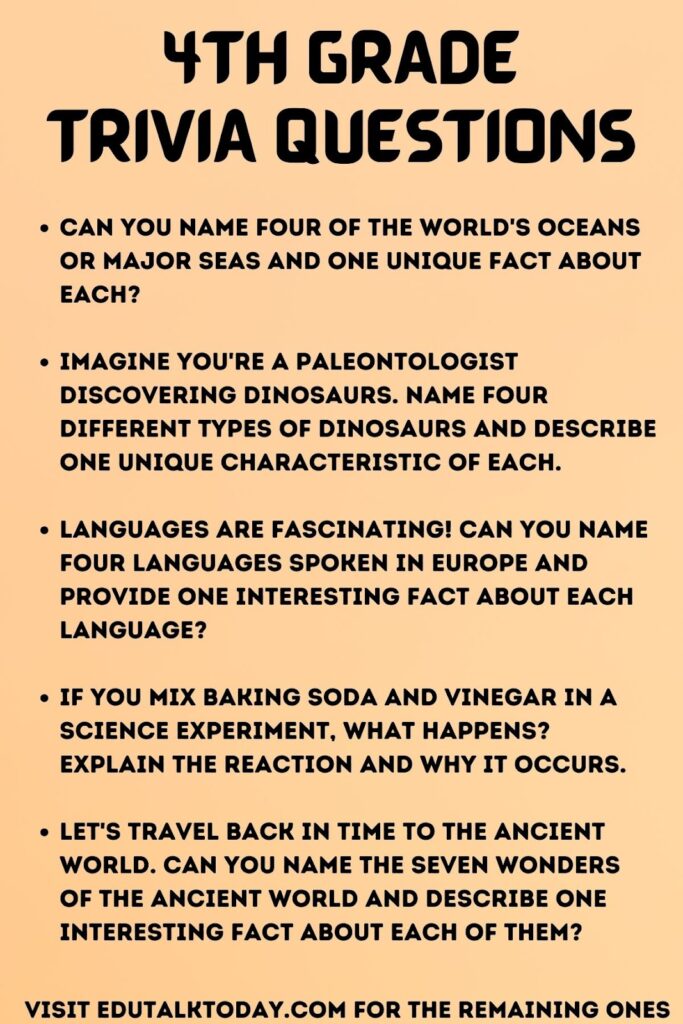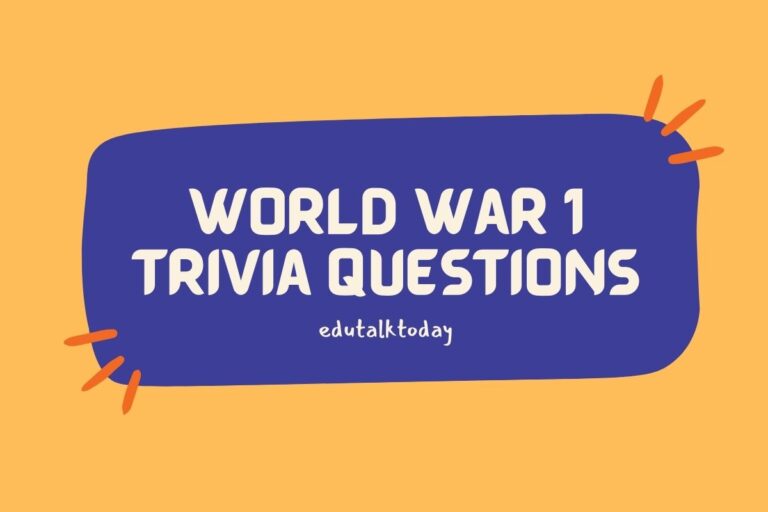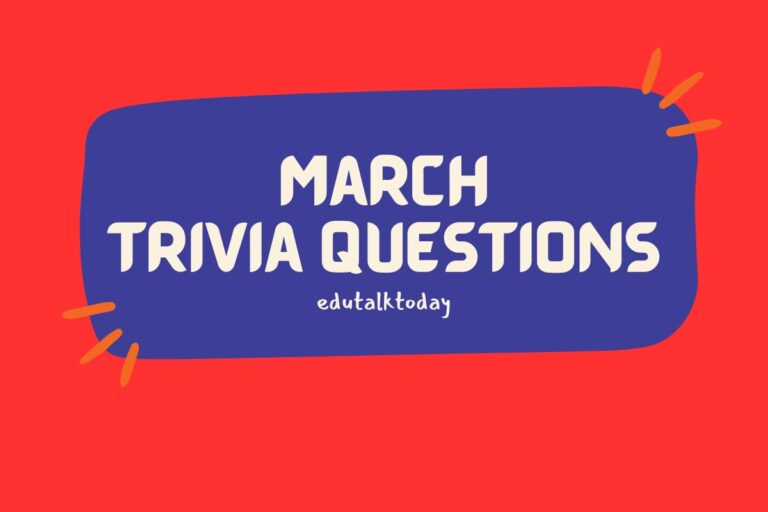36 4th Grade Trivia Questions
Trivia questions are a fantastic way to engage young minds and test their knowledge while having fun.
In this blog post, we’ve compiled a list of 4th-grade trivia questions that cover a wide range of topics, from science and history to pop culture and geography.
Whether you’re a teacher looking for a fun classroom activity or a parent seeking an entertaining way to spend time with your child, these questions are sure to spark curiosity and encourage learning.
4th Grade Trivia Questions
- The Solar System Explorer: Imagine you’re traveling through space, visiting each planet in our solar system. Starting from the sun, can you list the planets in order, including the dwarf planet Pluto?
- Ancient Wonders Journey: Let’s travel back in time to the ancient world. Can you name the Seven Wonders of the Ancient World and describe one interesting fact about each of them?
- Math Challenge: Suppose you have a large pizza cut into 8 slices. If you eat 3 slices and your friend eats 2 slices, how many slices are left? Also, what fraction of the pizza did you eat, and what fraction did your friend eat?
- Jungle Safari Adventure: Imagine you’re on a jungle safari. Identify four animals you might see in the Amazon Rainforest and describe one unique feature or fact about each animal.
- Underwater Exploration: Dive into the ocean and explore the Great Barrier Reef. What kinds of marine life can you find there? List at least four different marine creatures and a fascinating fact about each.
- Historical Figures Spotlight: Think about famous historical figures. Choose four individuals who made significant contributions to history and share a brief description of their achievements.
- Language Detective: Languages are fascinating! Can you name four languages spoken in Europe and provide one interesting fact about each language?
- Science Experiment: If you mix baking soda and vinegar in a science experiment, what happens? Explain the reaction and why it occurs.
- World Geography Challenge: Pick any four countries from different continents. For each country, name its capital city and one unique cultural or historical fact about it.
- Astronaut’s Diary: If an astronaut travels to the International Space Station (ISS), how long does it take to orbit the Earth once? Also, what is one interesting fact about living in the ISS?
- Dinosaur Discovery: Imagine you’re a paleontologist discovering dinosaurs. Name four different types of dinosaurs and describe one unique characteristic of each.
- Artists and Masterpieces: Let’s step into an art gallery. Can you name four famous painters and one of their most famous paintings?
- Volcano Expedition: Picture yourself as a volcanologist studying volcanoes. Name four types of volcanoes or volcanic features and describe one key characteristic or fact about each.
- The World of Insects: Explore the tiny world of insects. Name four different insects and share one fascinating fact about each.
- Famous Landmarks Quiz: Travel around the globe and identify four famous landmarks, stating the country where each is located and one interesting fact about it.
- Musical Instruments Exploration: Imagine you’re in a music store. Name four different musical instruments and describe what family of instruments they belong to (like string, wind, percussion, etc.).
- Astronomical Wonders: Look up at the night sky and identify four different constellations or celestial objects. Provide one interesting fact about each.
- Weather Wizard: As a weather expert, explain four different types of weather phenomena and what causes each.
- The Language of Numbers: Can you explain what a prime number is and list the first five prime numbers?
- Exploring Ancient Civilizations: Choose four ancient civilizations (like the Egyptians, Mayans, etc.) and mention one significant achievement or invention from each.
- Animal Habitats: Name four different animal habitats (like the desert, ocean, etc.) and an animal that is uniquely adapted to each habitat.
- World Leaders in History: Identify four important leaders from history around the world and mention one major contribution or event they are known for.
- The Human Body: The human body is amazing! Name four different organs in the human body and their primary function.
- Space Exploration Milestones: List four major milestones in the history of space exploration and briefly describe each.
- Oceans and Seas: Can you name four of the world’s oceans or major seas and one unique fact about each?
- Famous Books and Authors: Identify four famous books and their authors, and mention the main theme or story of each book.
- National Flags: Pick four countries and describe their national flags (colors, symbols, etc.).
- The Adventurous World of Books: Can you name four classic children’s books and their main characters?
- Wonders of Architecture: Identify four famous buildings around the world and describe a unique feature of each.
- The Plant Kingdom: Describe four different types of plants and one interesting fact about each.
- Math Puzzle: If you multiply any number by 9 and sum the digits of the result, why does it always reduce to 9? Give an example with a number.
- Musical Genres: Name four different musical genres and one popular song or artist associated with each genre.
- Inventors and Inventions: Identify four inventors and one invention each is famous for.
- Sports Around the World: Name four different sports and the country where each originated.
- The Animal Kingdom’s Oddities: Share four unusual or unique animals and an interesting fact about each.
- Folktales and Myths: Choose four folktales or myths from different cultures and provide a brief summary of each.
Answers
- The Solar System Explorer Answer: Starting from the sun, the order is Mercury, Venus, Earth, Mars, Jupiter, Saturn, Uranus, Neptune, and Pluto (dwarf planet). Pluto is known for its heart-shaped glacier.
- Ancient Wonders Journey Answer: The Seven Wonders are the Great Pyramid of Giza, Hanging Gardens of Babylon, Statue of Zeus at Olympia, Temple of Artemis at Ephesus, Mausoleum at Halicarnassus, Colossus of Rhodes, and Lighthouse of Alexandria. The Great Pyramid is the oldest and only surviving wonder.
- Math Challenge Answer: There are 3 slices left. You ate 3/8 of the pizza, and your friend ate 2/8 or 1/4.
- Jungle Safari Adventure Answer: In the Amazon, you might see jaguars (strong swimmers), toucans (colorful beaks), poison dart frogs (toxic skin), and sloths (very slow-moving).
- Underwater Exploration Answer: In the Great Barrier Reef, you can find clownfish (live in sea anemones), sea turtles (can live for decades), sharks (great white sharks occasionally visit), and coral (living organisms).
- Historical Figures Spotlight Answer: Four figures might be Isaac Newton (laws of motion), Cleopatra (last pharaoh of Egypt), Leonardo da Vinci (Renaissance artist and inventor), and Mahatma Gandhi (leader of Indian independence movement).
- Language Detective Answer: Spanish (spoken in Spain and many Latin American countries), French (has many silent letters), German (has three genders for nouns), and Italian (known for its musicality in pronunciation).
- Science Experiment Answer: Mixing baking soda and vinegar creates a chemical reaction that produces carbon dioxide gas, causing bubbling and fizzing.
- World Geography Challenge Answer: Japan (Tokyo, known for cherry blossoms), Brazil (Brasília, famous for Carnival), Egypt (Cairo, home to the pyramids), and Australia (Canberra, known for its unique wildlife like kangaroos and koalas).
- Astronaut’s Diary Answer: It takes about 90 minutes for the ISS to orbit the Earth once. An interesting fact is that astronauts experience about 16 sunrises and sunsets every day.
- Dinosaur Discovery Answer: Tyrannosaurus Rex (large, powerful jaws), Triceratops (three horns on its face), Brachiosaurus (long neck for reaching high vegetation), Velociraptor (known for its speed and agility).
- Artists and Masterpieces Answer: Leonardo da Vinci (“Mona Lisa”), Vincent Van Gogh (“Starry Night”), Pablo Picasso (“Guernica”), Claude Monet (“Water Lilies”).
- Volcano Expedition Answer: Shield volcanoes (broad, gently sloping sides), Stratovolcanoes (tall, symmetrical shape), Cinder cones (small, steeply angled sides), Lava domes (formed by slow-moving lava).
- The World of Insects Answer: Butterflies (taste with their feet), Ants (can lift over 20 times their body weight), Dragonflies (can fly in any direction), Bees (communicate through a “waggle dance”).
- Famous Landmarks Quiz Answer: Eiffel Tower (France, originally intended as a temporary structure), Great Wall of China (China, can be seen from space), Statue of Liberty (USA, a gift from France), Taj Mahal (India, built as a mausoleum).
- Musical Instruments Exploration Answer: Violin (string family), Trumpet (brass family), Piano (percussion and string family), Flute (woodwind family).
- Astronomical Wonders Answer: Orion (notable for the Orion’s Belt), Big Dipper (part of Ursa Major, used for navigation), Andromeda Galaxy (nearest spiral galaxy to the Milky Way), Halley’s Comet (visible from Earth every 75-76 years).
- Weather Wizard Answer: Tornadoes (caused by severe thunderstorms), Hurricanes (formed over warm ocean waters), Snow (occurs when temperatures are below freezing), Rainbows (caused by sunlight reflecting and refracting off water droplets).
- The Language of Numbers Answer: A prime number is a number greater than 1 that has no positive divisors other than 1 and itself. The first five prime numbers are 2, 3, 5, 7, and 11.
- Exploring Ancient Civilizations Answer: Egyptians (built pyramids), Mayans (developed an advanced calendar), Romans (built extensive road networks), Chinese (invented paper).
- Animal Habitats Answer: Desert (camel – can survive with little water), Ocean (dolphin – adapted to swim and communicate effectively), Rainforest (tree frog – able to climb trees), Arctic (polar bear – insulated by thick fur and fat).
- World Leaders in History Answer: Nelson Mandela (ended apartheid in South Africa), Cleopatra (last active ruler of the Ptolemaic Kingdom of Egypt), George Washington (first President of the United States), Mahatma Gandhi (led India’s non-violent independence movement against British rule).
- The Human Body Answer: Heart (pumps blood), Lungs (breathes in oxygen and exhales carbon dioxide), Stomach (digests food), Brain (controls the body and processes information).
- Space Exploration Milestones Answer: Launch of Sputnik (first artificial satellite), First man on the moon (Apollo 11 mission), Mars Rover landing (exploration of Mars), Hubble Space Telescope (provides deep space images).
- Oceans and Seas Answer: Pacific Ocean (largest and deepest ocean), Atlantic Ocean (second-largest ocean), Mediterranean Sea (surrounded by Europe, Asia, and Africa), Caribbean Sea (home to the Great Barrier Reef).
- Famous Books and Authors Answer: “Harry Potter” by J.K. Rowling (magic and adventures), “The Diary of a Young Girl” by Anne Frank (life during WWII), “Charlotte’s Web” by E.B. White (friendship between a pig and a spider), “The Little Prince” by Antoine de Saint-Exupéry (adventures and wisdom).
- National Flags Answer: United States (red, white, and blue with 50 stars and 13 stripes), Japan (white with a red circle in the center), Brazil (green, yellow, blue globe with stars, and a white band), India (orange, white, green with a blue wheel in the center).
- The Adventurous World of Books Answer: “Alice’s Adventures in Wonderland” (Alice), “The Adventures of Tom Sawyer” (Tom Sawyer), “Charlotte’s Web” (Wilbur the pig), “Peter Pan” (Peter Pan).
- Wonders of Architecture Answer: The Sydney Opera House (sails-like design), The Leaning Tower of Pisa (famous for its unintended tilt), The Empire State Building (iconic American skyscraper), The Taj Mahal (white marble mausoleum).
- The Plant Kingdom Answer: Cacti (adapted to store water), Venus Flytrap (eats insects), Sequoias (among the tallest trees in the world), Orchids (known for their beautiful flowers).
- Math Puzzle Answer: This happens due to the mathematical property of 9. For example, 9 × 8 = 72, and 7 + 2 = 9.
- Musical Genres Answer: Rock (Elvis Presley), Jazz (Louis Armstrong), Classical (Beethoven), Pop (Michael Jackson).
- Inventors and Inventions Answer: Thomas Edison (light bulb), Alexander Graham Bell (telephone), Marie Curie (research on radioactivity), Wright Brothers (airplane).
- Sports Around the World Answer: Soccer (England), Baseball (United States), Sumo Wrestling (Japan), Taekwondo (Korea).
- The Animal Kingdom’s Oddities Answer: Platypus (lays eggs but is a mammal), Narwhal (has a long tusk like a unicorn), Axolotl (can regenerate lost body parts), Tardigrade (can survive extreme conditions).
- Folktales and Myths Answer: “Anansi the Spider” (African folktale about a trickster spider), “The Legend of King Arthur” (British legend of a noble king and his knights), “The Tale of the Bamboo Cutter” (Japanese folktale about a princess from the Moon), “Icarus and Daedalus” (Greek myth about flying too close to the sun).






